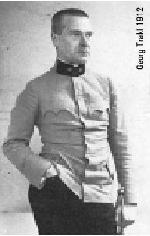Flannery O'Connor, Jaime Sabines
Die amerikanische Schriftstellerin Mary Flannery O’Connor wurde am 25. März 1925 in Savannah (Georgia) geboren. O’Connor besuchte die Peabody Laboratory School, wo sie 1942 ihren Abschluss machte. Dann ging sie auf das Georgia State College for Women, wo sie Englisch und Soziologie studierte (letzteres war eine Perspektive, die sie in ihrem Roman The Violent Bear It Away satirisch verarbeitete). 1946 wurde Flannery O’Connor in den angesehenen Iowa Writers’ Workshop aufgenommen. 1949 lernte O’Connor Robert Fitzgerald kennen und nahm schließlich eine Einladung an, bei ihm und seiner Frau, Sally, in Redding, Connecticut zu wohnen. 1951 wurde bei ihr Lupus erythematosus diagnostiziert. Daraufhin kehrte sie zu dem Bauernhaus ihrer Vorfahren Andalusia in Milledgeville zurück. Die Ärzte gaben ihr nur noch fünf Jahre; tatsächlich lebte sie noch fast 15 Jahre.
O’Connor schrieb zwei Romane und 31 Kurzgeschichten, aber auch eine Reihe von Buchbesprechungen und Kommentaren. Sie war eine Südstaaten-Schriftstellerin in der Art von William Faulkner, schrieb in einem Southern Gothic Stil und betonte regionale Schauplätze und - wie immer wieder gesagt wird - groteske Charaktere. Sie sagte „alles was aus dem Süden kommt, wird von Lesern aus dem Norden immer grotesk genannt, es sei denn es ist wirklich grotesk, dann wird es als realistisch bezeichnet“ (Mystery and Manners: Occasional Prose 40). Ihre zwei Romane waren Wise Blood (1952) und The Violent Bear It Away (1960). Sie veröffentlichte auch noch zwei Bücher mit Kurzgeschichten: A Good Man Is Hard to Find and Other Stories (1955) und Everything That Rises Must Converge (1965 nach ihrem Tod veröffentlicht).
Aus: Wise Blood
„Enoch Emery knew now that his life would never be the same again, because the thing that was going to happen to him had started to happen. He had always known that something was going to happen but he hadn't known what. If he had been much given to thought, he might have thought that now was the time for him to justify his daddy's blood, but he didn't think in broad sweeps like that, he thought what he would do next. Sometimes he didn't think, he only wondered; then before long he would find himself doing this or that, like a bird finds itself building a nest when it hasn't actually been planning to.
What was going to happen to him had started to happen when he showed what was in the glass case to Haze Motes. That was a mystery beyond his understanding, but he knew that what was going to be expected of him was something awful. His blood was more sensitive than any other part of him; it wrote doom all through him, except possibly in his brain, and the result was that his tongue, which edged out every few minutes to test his fever blister, knew more than he did.
The first thing that he found himself doing that was not normal was saving his pay. He was saving all of it, except what his landlady came to collect every week and what he had to use to buy something to eat with. Then to his surprise, he found he wasn't eating very much and he was saving that money too. He had a fondness for supermarkets; it was his custom to spend an hour or so in one every afternoon
after he left the city park, browsing around among the canned goods and reading the cereal stories. Lately he had been compelled to pick up a few things here and there that would not be bulky in his pockets, and he wondered if this could be the reason he was saving so much money on food. It could have been, but he had the suspicion that saving the money was connected with some larger thing. He had always been given to stealing but he had never saved before.“
Flannery O'Connor (25. März 1925 – 3. August 1964)
Der mexikanische Lyriker Jaime Sabines wurde geboren am 25. März 1926 in Tuxtla Gutiérrez, Chiapas. Obwohl Sabines nie von der Poesie leben konnte, war sie sein Leben. Sein Brot verdiente er sich mit dem Verkauf von Futtermitteln für Kühe, auch der „geistigen Gesundheit“ wegen, um sich nicht von „intellektueller Frivolität“ anstecken zu lassen, so Sabines. Er gehörte zur Generation von Carlos Fuentes, Efraín Huerta und Rosario Castellanos, beeinflußt vor allem von César Vallejo und Pablo Neruda. In seiner Dichtung sind sowohl Spuren der Volkspoesie als auch die von Klassikern und Avantgardisten auszumachen; seine Gedichte sind nicht nur in unzähligen Anthologien, sondern auch im kollektiven Gedächtnis festgehalten, sie werden spontan rezitiert und ziehen vor allem ein junges Publikum an.
Pedestrian
It's said, it's rumored, they affirm it in the salons, at parties, someone
or many in the know, that Jaime Sabines is a great poet. Or at least a good
poet. Or a poet who's decent, worthy. Or simply, really, a poet.
Jaime hears the news and he's happy: how marvelous! I'm a poet! I'm an
important poet! I'm a great poet! convinced, he goes out or comes home,
convinced. But in the street, no one, and in the house, fewer: no one
notices that he's a poet. Why don't the poets have a star before them, or a
visible brilliance, or a ray of light shining from their ears?
My god, says Jaime. I have to be a father or husband, work in the factory
like others, or go about, like others, as a pedestrian.
That's it! says Jaime. I'm not a poet. I'm a pedestrian.
And this time he hangs about in bed, sweetly happy and tranquil.
Consider It Well
They say that I have to exercise to lose weight,
that at fifty fat and cigarettes are dangerous,
that one should keep one's figure
and fight the battle of time, of age.
Well-intentioned experts and friendly doctors
recommend diets and programs
to prolong life a few years more.
I'm thankful for the good intention, but I laugh
at how shallow are the prescriptions, how stingy the fervor.
(Death too laughs at these things.)
The only recommendation I'll seriously consider
is to find a young woman for my bed
because at this age
youth is the only thing that comes close to curing this disease.
Übersetzt von Athena Kildegaard
Jaime Sabines (25. März 1926 – 19. März 1999)
O’Connor schrieb zwei Romane und 31 Kurzgeschichten, aber auch eine Reihe von Buchbesprechungen und Kommentaren. Sie war eine Südstaaten-Schriftstellerin in der Art von William Faulkner, schrieb in einem Southern Gothic Stil und betonte regionale Schauplätze und - wie immer wieder gesagt wird - groteske Charaktere. Sie sagte „alles was aus dem Süden kommt, wird von Lesern aus dem Norden immer grotesk genannt, es sei denn es ist wirklich grotesk, dann wird es als realistisch bezeichnet“ (Mystery and Manners: Occasional Prose 40). Ihre zwei Romane waren Wise Blood (1952) und The Violent Bear It Away (1960). Sie veröffentlichte auch noch zwei Bücher mit Kurzgeschichten: A Good Man Is Hard to Find and Other Stories (1955) und Everything That Rises Must Converge (1965 nach ihrem Tod veröffentlicht).
Aus: Wise Blood
„Enoch Emery knew now that his life would never be the same again, because the thing that was going to happen to him had started to happen. He had always known that something was going to happen but he hadn't known what. If he had been much given to thought, he might have thought that now was the time for him to justify his daddy's blood, but he didn't think in broad sweeps like that, he thought what he would do next. Sometimes he didn't think, he only wondered; then before long he would find himself doing this or that, like a bird finds itself building a nest when it hasn't actually been planning to.
What was going to happen to him had started to happen when he showed what was in the glass case to Haze Motes. That was a mystery beyond his understanding, but he knew that what was going to be expected of him was something awful. His blood was more sensitive than any other part of him; it wrote doom all through him, except possibly in his brain, and the result was that his tongue, which edged out every few minutes to test his fever blister, knew more than he did.
The first thing that he found himself doing that was not normal was saving his pay. He was saving all of it, except what his landlady came to collect every week and what he had to use to buy something to eat with. Then to his surprise, he found he wasn't eating very much and he was saving that money too. He had a fondness for supermarkets; it was his custom to spend an hour or so in one every afternoon
after he left the city park, browsing around among the canned goods and reading the cereal stories. Lately he had been compelled to pick up a few things here and there that would not be bulky in his pockets, and he wondered if this could be the reason he was saving so much money on food. It could have been, but he had the suspicion that saving the money was connected with some larger thing. He had always been given to stealing but he had never saved before.“
Flannery O'Connor (25. März 1925 – 3. August 1964)
Der mexikanische Lyriker Jaime Sabines wurde geboren am 25. März 1926 in Tuxtla Gutiérrez, Chiapas. Obwohl Sabines nie von der Poesie leben konnte, war sie sein Leben. Sein Brot verdiente er sich mit dem Verkauf von Futtermitteln für Kühe, auch der „geistigen Gesundheit“ wegen, um sich nicht von „intellektueller Frivolität“ anstecken zu lassen, so Sabines. Er gehörte zur Generation von Carlos Fuentes, Efraín Huerta und Rosario Castellanos, beeinflußt vor allem von César Vallejo und Pablo Neruda. In seiner Dichtung sind sowohl Spuren der Volkspoesie als auch die von Klassikern und Avantgardisten auszumachen; seine Gedichte sind nicht nur in unzähligen Anthologien, sondern auch im kollektiven Gedächtnis festgehalten, sie werden spontan rezitiert und ziehen vor allem ein junges Publikum an.
Pedestrian
It's said, it's rumored, they affirm it in the salons, at parties, someone
or many in the know, that Jaime Sabines is a great poet. Or at least a good
poet. Or a poet who's decent, worthy. Or simply, really, a poet.
Jaime hears the news and he's happy: how marvelous! I'm a poet! I'm an
important poet! I'm a great poet! convinced, he goes out or comes home,
convinced. But in the street, no one, and in the house, fewer: no one
notices that he's a poet. Why don't the poets have a star before them, or a
visible brilliance, or a ray of light shining from their ears?
My god, says Jaime. I have to be a father or husband, work in the factory
like others, or go about, like others, as a pedestrian.
That's it! says Jaime. I'm not a poet. I'm a pedestrian.
And this time he hangs about in bed, sweetly happy and tranquil.
Consider It Well
They say that I have to exercise to lose weight,
that at fifty fat and cigarettes are dangerous,
that one should keep one's figure
and fight the battle of time, of age.
Well-intentioned experts and friendly doctors
recommend diets and programs
to prolong life a few years more.
I'm thankful for the good intention, but I laugh
at how shallow are the prescriptions, how stingy the fervor.
(Death too laughs at these things.)
The only recommendation I'll seriously consider
is to find a young woman for my bed
because at this age
youth is the only thing that comes close to curing this disease.
Übersetzt von Athena Kildegaard
Jaime Sabines (25. März 1926 – 19. März 1999)
froumen - 25. Mär, 18:43



